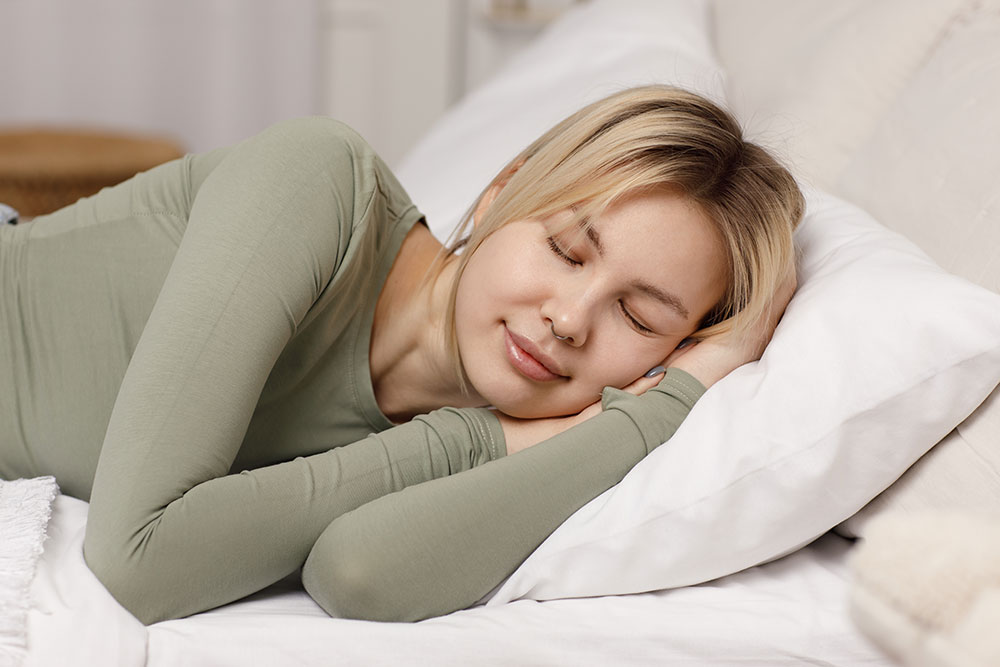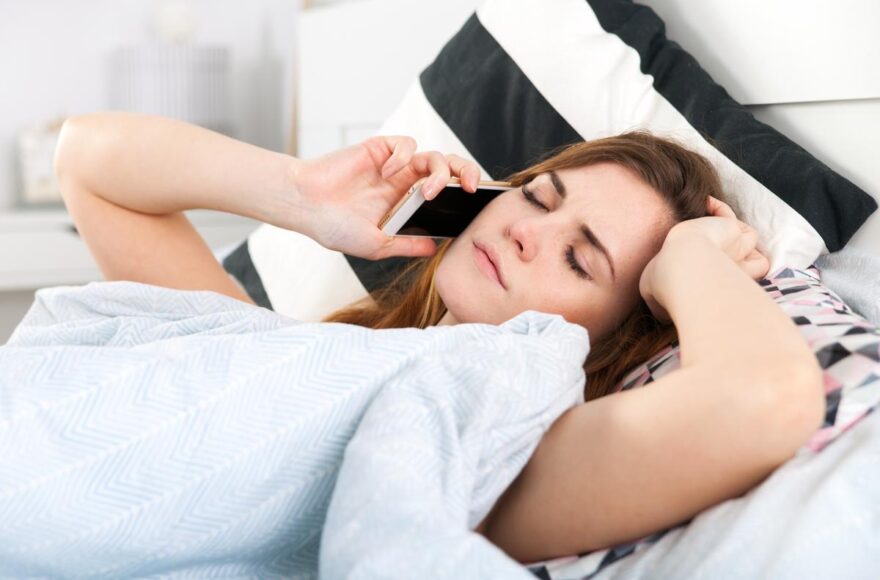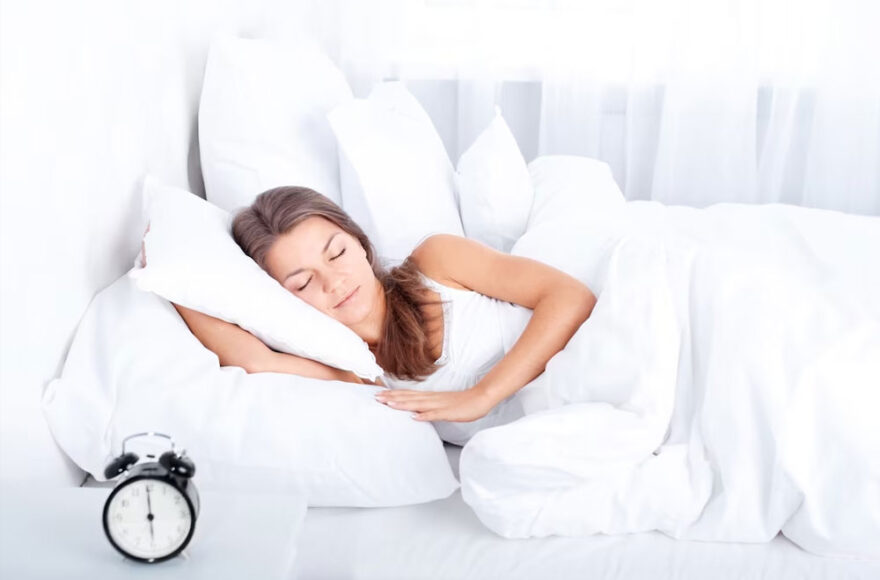Every Thing You Need to Know About Healthy Sleep Habits

Table of Contents
- What is Healthy Sleep?
- What is a Healthy Sleep Pattern?
- How much sleep do you need?
- Sleep Continuity
- Sleep Timing
- Is Your Sleep Healthy?
- Tips to Get Healthy Sleep
- 2. Increase your exposure to light
- 5. Avoid caffeine after midday
- 6. Stick to your sleep routine
- 7. Eat a light meal at night
- 8. Dim the lights in the evening
- 9. Turn off electronic devices
- 10. Optimize your bedroom
- 11. Regulate your bedroom temperature
- 12. Develop a relaxing bedtime routine
- 13. Kick fido out of your room
- 14. Quit smoking
- 15. Limit your alcohol
- 16. Manage your stress
- 17. Save your bed for sleep
What is Healthy Sleep?
Having adequate and quality sleep is essential for feeling good and functioning properly. It not only improves our immune system but also maintains our overall health. Sleep is equally important as food and water. Yet, in today’s fast-paced world, we overlook its significance and stay awake for work, socializing, or entertainment, which can negatively affect our bodies and minds.
In recent years, scientists have researched how sleep produces impacts our bodies and why sleep is essential for our bodies. As we know that sleep is crucial to
- Repair muscle tissue
- Restore energy
- Maintain critical body functions
- Allow the brain to process new information
Also, healthy sleep can improve
- Learning
- Memory
- Creativity
- Mood
You may feel low-energy, less focused, and irritable if you do not get enough sleep. Lack of sleep can also lead to various physical and mental problems and increase the risk of chronic diseases such as
- Diabetes
- Cardiovascular disease
- Obesity
- Depression
Sometimes we may face specific reasons for not sleeping well. Still, repeating this pattern for several nights could severely impact our physical and mental health. To ensure healthy sleep, we must develop consistent habits and patterns, allowing us to successfully sleep for several uninterrupted hours.
What is a Healthy Sleep Pattern?
Sleep is a complex process and consists of four stages. Stages 1 to 3 are non-rapid eye movement (NREM) sleep and rapid eye movement (REM) sleep. When you sleep, your body passes through a cycle of sleep stages, from light sleep (stages 1 and 2) to deep sleep (stage 3) and then rapid eye movement (REM) sleep. Your body passes these stages multiple times in each sleep cycle. An average sleep cycle lasts about 90 minutes.
You need four to six sleep cycles every 24 hours to feel fresh and rested. While the time you spend in each stage may vary as you sleep longer. Also, you might bounce between stages each night. The sleep cycle varies from person to person and changes as we age. The newborns get more deep sleep compared to adults.
Below we share a breakdown of the sleep cycle.
NREM Stage 1
- Light sleep stage.
- Lasts for five to 10 minutes.
- Your body and brain activity is beginning to slow down.
- Waking up at this stage makes you tired and sleepy.
NREM Stage 2
- Light sleep stage.
- Last up to 25 minutes.
- Your muscles begin to relax.
- Decrease in body temperature and heart rate.
- Your breathing slows down.
- Your eye movement stops.
- Your brain starts to store your memories.
- Your brain commands your body to shut down your senses for uninterrupted sleep.
- Your body is prepared to enter into a deep sleep.
NREM Stage 3
- Deep sleep stage.
- This stage lasts 20 to 40 minutes and gets increasingly shorter as sleep cycles progress.
- Your muscles and eyes are entirely at rest.
- Your body starts to repair itself by regrowing tissue, building bones and muscle, and strengthening your immune system.
- You are unable to wake up during this stage. But if you woke up, you feel disoriented and less focused for 30 minutes or an hour.
- As you age, you spend less time in this stage and more time in Stage 2.
REM Sleep
- Dreaming stage.
- Brain activity is increased to match or exceed your usual brain activity.
- Your muscles are in a temporary state of paralysis.
- But your eyes and muscles, you need to breathe, move rapidly during this stage.
- A gradual increase begins in breathing, heart rate, and blood pressure.
- The first period of REM sleep lasts 90 minutes, and the last is about 10 minutes.
- The later REM stages in each sleep cycle get longer the more hours you remain asleep.
How much sleep do you need?
As we age, our sleep needs change. You should aim to get the amount of sleep listed below recommended by The National Sleep Foundation
- Most adults(18 to 64 years) should get sleep between 7 to 9 hours each night.
- Elder adults(65 years and over) should get sleep between 7 to 8 hours each night.
- Teenagers(14 to 17 years) should get sleep between 8 to 10 hours each night.
- Children(6 to 13 years) should get sleep between 9 to 11 hours each night.
Younger children and newborns require more sleep for rapid growth and development.
The recommended values are
- Toddlers (3 to 5 years) should get sleep between 10 to 13 hours.
- Toddlers (1 to 2 years) should get sleep between 11 to 14 hours.
- Babies(4 to 11 months old) should get sleep between 12 to 15 hours.
- Newborns(0 to 3 months old) should get sleep between 14 to 17 hours.
Many factors, such as your genetic makeup, activity level, and daily schedule, can affect a good night’s sleep.
Sleep Continuity
A night of continuous, uninterrupted sleep is considered healthy or quality sleep. Besides duration, how long you stay asleep is crucial for getting enough sleep. A peaceful whole night’s sleep with minimal disruption is more restorative than a disturbed full night’s sleep. Disrupted sleep interferes with the natural cycling process through all four sleep stages. You may get bounced between stages 1 and 2, which keeps you from getting a healthy amount of deep and REM sleep.
People with sleep apnea may experience brief partial awakenings due to lapses in breathing during the night. Although they had a whole night’s sleep, the interruptions in sleep make them suffer from the effects of sleep deprivation. Researches suggest that getting continuous sleep plays a vital role in our brain and body functioning.
Sleep Timing
The last thing which affects healthy sleep is sleep timing. The timing of your sleep in 24 hours is also crucial. Your internal body clock (Circadian rhythms) processes your 24 hours and cues your body to fall asleep. Several environmental factors can regulate your internal body clock. Light is the most important regulator of your internal body clock.
Light delays the clock and keeps you alter and awake. While in dim lighting or darkness, your body releases sleep hormones that make you fall asleep. When sleep timing is not synchronized with circadian rhythms, it is more difficult to fall asleep, stay asleep, and get enough hours of sleep. Shift workers or people experiencing jet lag are good examples of unsynchronized circadian rhythms. Also, maintaining a regular bedtime promotes healthy sleep and reduces the risk of obesity and diabetes.
Is Your Sleep Healthy?
After getting a whole night’s sleep, how do you know you get a healthy or quality sleep. Below are some daytime indicators that help you to know you have a healthy sleep pattern
- Waking up feeling refreshed in the morning.
- Having lots of energy during the day.
- Being in a good mood.
- Feeling clear-headed.
On the other hand, these indicators will tell that your sleep pattern is not healthy. You are not getting enough sleep or are chronically sleep-deprived. The lack of sleep can show specific symptoms, such as the following
- Trouble getting up in the morning.
- Struggle to focus or concentrate.
- Irritability, depression, or anxiety.
- Feeling sleepy during the day or needing to schedule daytime naps.
- Sleeping much longer or later on unstructured days.
If your experience one or more of these symptoms, follow good sleep hygiene or habits to get enough sleep or stay asleep. You can change your sleep habits by changing your environment, planning your daily activities, and establishing a bedtime routine.
Tips to Get Healthy Sleep
Practicing good sleep hygiene can help you get better sleep. Good sleep hygiene involves healthy changes in your daily routine, diet, and sleeping habits. Here are some helpful tips to get a healthy sleep.
1. Do regular exercise
Researchers suggest that regular physical activity can promote better sleep. Try to get 150 minutes of moderate exercise each week. But do not exercise before 2 hours your bedtime; it can disturb your good night’s sleep. The post-workout energy keeps you alter and active, and you may get trouble falling asleep.
2. Increase your exposure to light
Increasing your exposure to light during the day can help you to get better sleep at night. Being in the sunlight early in the morning can help synchronize circadian rhythm. Also, sunlight is an essential source of vitamin D, which is vital for a night of healthy sleep. The lack of Vitamin D is linked to a higher risk of sleep disorders.
4. Avoid longer daytime naps
Longer daytime naps can interrupt your good night’s sleep. Although it is vital for newborns and children’s growth and development. If you take naps, keep them to 20 minutes or less. But if you work at night, you might need to nap late in the day before work.
5. Avoid caffeine after midday
Avoid drinking tea, coffee, soft drinks, and foods (chocolate) that have caffeine after midday or late at night. Caffeine is a stimulant that can make you more alert and awake at night. It is also a diuretic that can increase your bathroom trips at night.
6. Stick to your sleep routine
Try to wake up and sleep at the same time, even on weekends. The constant wake-up and sleep timings can synchronize your biological clock. It can help your body to fall asleep.
7. Eat a light meal at night
Eat a light meal at night and at least 2 hours before your bedtime. Avoid spicy and heavy meals. They can cause heartburn or indigestion, keeping you awake at night.
8. Dim the lights in the evening
Starting dimming the lights in the evening or 2 hours before bedtime can cue your body to fall asleep. Dim light can tell your body to release sleep hormone(melatonin).
9. Turn off electronic devices
Turn off electronic devices 2 hours before your bedtime in the evening. These electronic devices, such as TV, laptop tab or cell phones, emit blue light, which alters your internal clock and keep you awake at night. Do not sit in bed and use a laptop or cell phone for work or socializing. It can make you stay awake at late hours of the night.
10. Optimize your bedroom
Make your bedroom a clean, quiet, and relaxing place. Install dark curtains to block light coming from outside. You can also use a white noise machine or pedestal fan to avoid external noises.
11. Regulate your bedroom temperature
Keeping your bedroom temperature around 65 degrees is considered best for sleep. Assure the temperature is right for you, not too cold or hot. Buy blankets and pillows for your comfort.
12. Develop a relaxing bedtime routine
Develop your own relaxing bedtime routine that cues your body to get good sleep. This includes a warm bath, listing to relaxing music, or reading a book. You can also use relaxing techniques such as meditation, yoga, or thi-chi. These techniques can relax your mind and soul and relieve stress. Stress can keep you awake at night and make it difficult to fall asleep.
13. Kick fido out of your room
Keep your pets out of your room to get better sleep. Your fluffy mate can disturb your sleep if they move or get up in the middle of the night. They can snuggle under the covers with you, which can raise your body temperature and disrupt your sleep. Make them sleep at their place.
14. Quit smoking
Cigarettes have the active compound nicotine, which is a stimulant. This can disturb your good night’s sleep. Aim to reduce or quit smoking to get better Zzz’s.
15. Limit your alcohol
If you have a habit of drinking a glass or two before sleeping, cut this to get better sleep. Alcohol can mess with your healthy sleep. It makes you fall asleep early, but when its effects wear off, you wake up in the middle of the night. You might face trouble getting back to falling asleep. Also, this interruption in sleep can make you feel tired and drowsy the next morning.
16. Manage your stress
Keep your worries and stress outside your bedroom. Try to resolve your worries or concerns before bedtime. And leave the remaining ones for the next day. Starting organizing your things, setting priorities, and delegating tasks for the next day before bedtime can help.
17. Save your bed for sleep
Save your bed only for sleep. Do not sit in your bed and do work, play games, or socialize. Using a phone or laptop can make your brain alter and active for several hours. If you don’t fall asleep within 20 minutes, get out of the bedroom and do something relaxing or boring that makes you sleepy.





